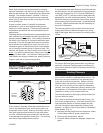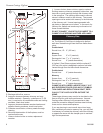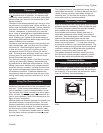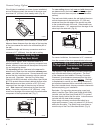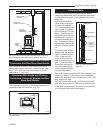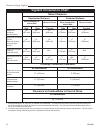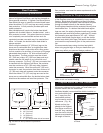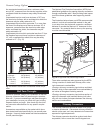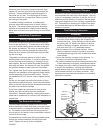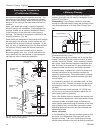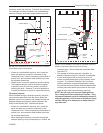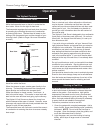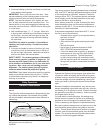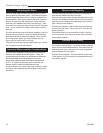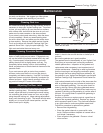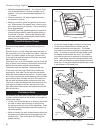
13
Vermont Castings Vigilant
2000898
Horizontal runs of chimney connectors should slope
upward 1/4” per foot going from the stove toward the
chimney. The recommended maximum length of a
horizontal run is 3 feet. The total length of chimney
connector should be no longer than 8 feet to prevent
the cooling of flue gases.
In cathedral ceiling installations, a prefabricated
chimney should be brought down to within 8 feet of
the stove. The whole chimney connector should be
exposed and accessible for inspection and cleaning.
Never pass a chimney connector through a combustible
ceiling.
Installation Procedures
Setting Up the Stove
Our stoves are heavy and require at least two people
to move and set them up. To make the job a bit easier,
you may lift off the loading doors and remove the grid-
dle, grates, and ashpan. Do not try to move the stove
alone as the stove can be damaged by mishandling.
Place the stove close to its final position before install-
ing the stove legs.
The griddle has not been painted in order to allow
cooking directly on its surface. In order to protect the
surface from rust during shipping, a coating of oil has
been applied. Be sure to wash the griddle thoroughly
with soap and water. As the stove is used, the griddle
will gradually darken to match the color of the stove.
Your Vigilant Coal Stove arrives completely assembled
except for the installation of the legs and handle holder,
and the assembly of the removable handle. The only
tool needed are a 9/16” wrench, used to tighten the leg
bolts.
So that you can easily secure the first section of chim-
ney connector pipe to the stove, three holes have been
drilled in the flue collar and three sheetmetal screws are
included in the hardware package.
If you have ordered any accessories such as heat
shields, they will come with their own installation
instructions. Generally speaking, nothing more compli-
cated than a screwdriver is involved in the installation of
accessories.
The Removable Handle
The removable handle is inserted into the front door
stub or the damper handle stub when you want to open
or close the doors, or change the position of the damp-
er. The handle is removed when not being used so it
will not get hot, and stored in the handle holder installed
on one of the front legs.
To assemble the handle, pass the long threaded screw
through the ceramic shaft and into the bright metal
insert. Tighten until snug; do not overtighten.
Chimney Connector Dampers
Because of the draft requirements of our stoves, we do
not recommend the use of an in-flue damper. Not only
is this an unnecessary restriction in the flue, but it is an
additional surface directly in the path of the flue gases
upon which deposits can form, creating a potential haz-
ard. Combustion air entering your Vigilant Coal stove
is controlled effectively by the thermostat, so no flue
damper is required.
The Chimney Connector
Assembly
• Assemble the chimney connector beginning at the
flue collar of the stove, keeping the crimped ends
towards the stove. Using the holes in the flue collar
as guides, drill 1/8” holes in the bottom of the first
section of chimney connector, and secure it to the
flue collar with #10 x 1/2” sheetmetal screws.
• Align the seams of the individual sections. Secure
each joint between sections of chimney connector,
including telescoping joints, with at least three sheet-
metal screws.
• Secure the chimney connector to the chimney. In-
structions for various installations follow.
• Be sure the installed stove and chimney connector are
correct distances from nearby combustible material.
Your dealer may offer a variety of specialty pipe pieces
to simplify the installation, including slip pipes and
thimble sleeves that can be used to form telescoping
joints between sections of chimney connector. Tele-
scoping joints may eliminate the need to cut individual
sections of connector.
ST693
Vigilant
freestanding
installation
8/01
Chimney
Elbow
Slip Pipe
Standard
Connector
Oval to Round
Connector
Flue Collar
Thimble
Flue
Liner
Flue
ST693
Fig. 17 An exploded view of the chimney connection in a
freestanding masonry installation.



